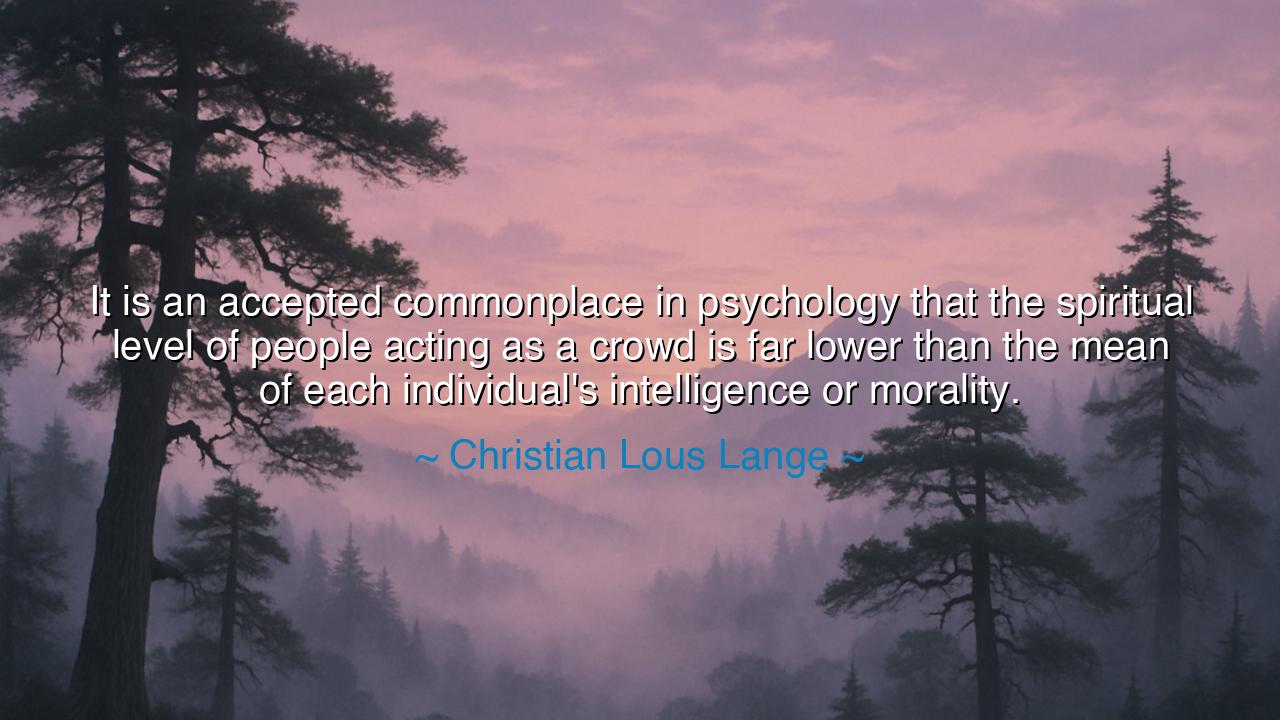
It is an accepted commonplace in psychology that the spiritual
It is an accepted commonplace in psychology that the spiritual level of people acting as a crowd is far lower than the mean of each individual's intelligence or morality.






In the greatest of human endeavors, there lies a truth as old as time: the power of the individual can be both magnified and diminished when swept into the collective will. The words of Christian Lous Lange, “It is an accepted commonplace in psychology that the spiritual level of people acting as a crowd is far lower than the mean of each individual's intelligence or morality,” reveal a deep understanding of the dynamics of the collective soul. Lange speaks of a dark truth—the idea that when individuals come together as part of a crowd, their higher nature, their morality, and their intelligence can often fall prey to the lowest common denominator. The crowd, in its moment of collective force, can act in ways that no single individual, acting alone, might ever consider.
This principle was known even to the ancients. The Greek philosopher Plato, in his work The Republic, warned of the dangers of the mob and the democracy of the uneducated. In Plato’s view, when people gathered in great numbers, their wisdom often disappeared, replaced instead by passion, impulse, and irrationality. Like the tyrant who rises from the chaos of the mob, individuals within crowds lose sight of their individual reason and act not from virtue, but from emotion. Lange’s words resonate with the wisdom of Plato: crowds, although composed of intelligent and moral individuals, can sink to a lower level of behavior than the sum of their parts.
A powerful example from history is the French Revolution, a time when the cries of the oppressed rose in a collective frenzy. The ideals of liberty, equality, and fraternity were the rallying cries of the people, yet, as the revolution unfolded, those same ideals were often lost in the bloodlust of the mob. The Reign of Terror followed, during which even the most rational of minds were swept up in the violence. Maximilien Robespierre, once a leader of the revolution’s moral high ground, became part of the very crowd that executed thousands, including his closest allies. In the frenzy of the crowd, reason and morality gave way to fear, anger, and a blind, collective desire for vengeance. The revolution, in its attempt to elevate the people, instead led them to lower depths, where the intelligence and virtue of its individuals were swallowed by the darkness of the mob.
The spiritual descent of the crowd is not only a concept of the past; it is also seen in modern times. Fascism, in the 20th century, rose in part because of the collective energy of a people swept up in nationalism and propaganda. In Nazi Germany, ordinary men and women, acting as part of a crowd, participated in atrocities that they would not have committed as individuals. The same people who were once neighbors, teachers, and artists, when swept into the collective identity, engaged in unthinkable acts. Lange’s warning is not just historical; it is a call to remain vigilant against the loss of individuality within the mob.
What Lange teaches us is the importance of self-awareness. We must never forget that when we are part of a crowd, our moral compass can be clouded. The power of the individual lies in the ability to think critically, to act from a place of conscience, and to rise above the collective impulses of the moment. A crowd may shout for vengeance, but the wise individual will speak for mercy. A mob may demand war, but the enlightened person will seek peace. True strength lies in maintaining one’s integrity and intelligence amidst the noise and chaos of the world.
The lesson here is timeless: do not lose your soul in the crowd. Think for yourself, and always strive to rise above the lowest inclinations of the masses. Whether in politics, in social movements, or in everyday life, remember that power often resides in individuality, in the ability to think independently, and in the willingness to act from a place of moral clarity. Do not allow the crowd to sweep you away into irrationality and violence. As Socrates once said, “The unexamined life is not worth living.” In the same way, the unexamined crowd leads to actions that no individual, acting alone, would ever deem righteous.
Let us then seek to be individuals, even in the midst of great numbers. Let us remind ourselves that the strength of the collective is found in the individuals who choose wisdom, reason, and compassion over impulse and destruction. When the crowd calls out for action, let us pause, reflect, and ensure that our choices reflect the best of our intelligence and morality, not the worst of the collective’s darker tendencies. In doing so, we can rise above the dangers Lange warns of and create a world that honors the dignity of each individual soul, even when we stand together.






AAdministratorAdministrator
Welcome, honored guests. Please leave a comment, we will respond soon